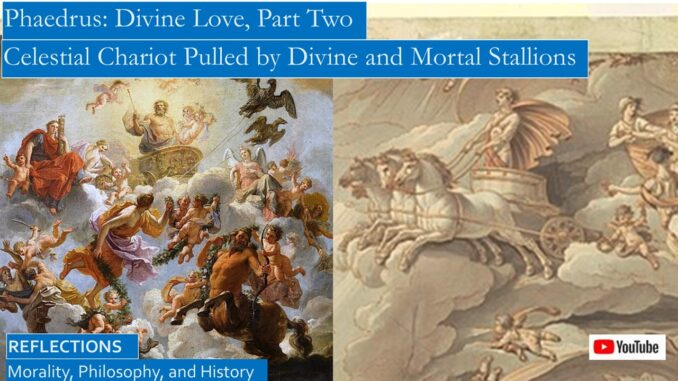
What can we learn by reflecting on the third speech by Socrates on Divine Love, in the Platonic Dialogue, the Phaedrus?
How do carnal love and divine love differ?
Does Plato and Socrates condone pederasty, or men-boy love?
In the Phaedrus is the most vivid allegory in the Platonic dialogues: the divine chariot pulled by both immortal and mortal stallions.
PLATONIC DIALOGUE OF PHAEDRUS ON DIVINE LOVE
Plato composed two dialogues on love, the Symposium and Phaedrus, they both are among his classic dialogues. The Symposium was a dinner party where the guests were too hung over from the night before and plan a quieter evening giving speeches on love. The guests first offer a series of speeches on romantic love, or carnal love, then Socrates then delivers a dialogue on divine love. Carnal, or romantic love, can be so disordered that it is selfish and predatory, but romantic love can be a beneficial selfless love if it is also a divine love, where the lover truly cares for the beloved.
Powerpoint script, with Amazon book links:
https://www.slideshare.net/BruceStrom1/platos-dialogue-of-phaedrus-on-divine-love-and-the-heavenly-chariot-part-2
Plato’s and Xenophon’s Symposium:
Romantic or Carnal Love: https://youtu.be/OIe5pn2S1Ls
Noble or Divine Love: https://youtu.be/z6X3pwVTdrc
The Phaedrus has a series of three speeches on love. The first speech is by Lysias, who is attempting to seduce the youth Phaedrus into a predatory pederastic, or a man-boy love relationship. Socrates objects to this speech on moral and rhetorical grounds. First, Lysias discusses lovers and non-lovers, but never defines these terms. Second, the speech is a collection of random thoughts with no logical structure. So, Socrates, since Phaedrus is fond of Lysias, attempts to repair this speech in a second speech.
But when Socrates attempts to define and organize the speech, he only succeeds in exposing how predatory pederasty, or men-boy love, can be. His daemon whispers in his ear that he must right this wrong done to the soul of Phaedrus with a third speech on divine love.
But Plato and Socrates do not condemn pederasty, but rather seek that all romantic relationships, both heterosexual and homosexual, be purged of their obsessive desire, so they are transformed into a divine love.
Although there were Greeks who were wary of pederasty, for example, Lycon, the father of Autolycus in Xenophon’s Symposium, Plato’s Socrates could not directly challenge pederasty, it was too imbedded into ancient Greek culture. Do not forget that Socrates was tried and executed for corrupting the youth, and for his supposed impious beliefs, that he did not believe in the gods.
Death of Socrates, Xenophon and Plato: https://youtu.be/Mip1vgRKH1E
The practice of pederasty is so imbedded in Greek culture that there is even a myth where Zeus, in the form of an eagle, abducts the mortal youth Ganymede. Ganymede is granted immortality as the cup bearer of Zeus, and his father is placated by a gift of immortal horses delivered by the god Hermes.[1]
FINAL SPEECH BY SOCRATES ON DIVINE LOVE
After the aborted attempt to improve the imperfect and unimprovable speech by Lysias, who wants to take advantage of Phaedrus, the daimon of Socrates whispers in his ear, that he must make amends, he must correct this false praise of a carnal love that is manipulative and exploiting. This speech Socrates delivers, not “veiled and ashamed “as he was when trying to recast the irredeemable speech by Lysias, “but with forehead bold and bare.”
SOCRATES: “I mean to say that as I was about to cross the stream the usual sign was given to me, that sign which always forbids, but never bids, me to do anything which I am going to do; and I thought that I heard a voice saying in my ear that I had been guilty of impiety, and that I must not go away until I had made an atonement. Now I am a diviner, though not a very good one,” “and I am beginning to see that I was in error. O my friend, how prophetic is the human soul!”
This reminds me of a talk by Phillip Cary, a favorite Teaching Company professor, on how you cannot find God’s will for your life by listening to the voice in your heart. That small voice, he argues, is your voice, not God’s, though you can train your voice to be a better conscience for you.
https://www.youtube.com/watch?v=az6YA_8TLTk&list=PL30C4A34FA6A2C30C
What was the glaring error in this speech by Lysias?
SOCRATES: “If love is a divinity, he cannot be evil. Yet this was the error of both the speeches. There was also a simplicity about them which was refreshing; having no truth or honesty in them, nevertheless they pretended to be something, hoping to succeed in deceiving the manikins of earth and gain celebrity among them. Wherefore I must have a purgation,” recanting my attempt to recast a speech that could not and should not be improved.
Socrates then speaks of the various kinds of madness, including the madness of prophecy, and the madness of love, and we welcome the reader to study this part of the dialogue. But this leads to Socrates examining the desirable madness of true love, where both lovers seek to serve the other, which is also a divine love.
In his memorable metaphor for the nature of the soul, Socrates describes “a pair of winged horses and a charioteer. Now the winged horses and the charioteers of the gods are all of them noble and of noble descent, but those of other races are mixed; the human charioteer drives his in a pair; and one of them is noble and of noble breed, and the other is ignoble and of ignoble breed; and the driving of them of necessity gives a great deal of trouble to him.”
How does the mortal differ from the immortal creature? The soul,” “when perfect and fully winged, soars upward, and orders the whole world, whereas the imperfect soul, losing her wings and drooping in her flight at last settles on the solid ground. There, finding a home, she receives an earthly frame which appears to be self-moved, but is really moved by her power; and this composition of soul and body is called a living and mortal creature. No such union can be immortal,” though you can imagine “an immortal creature having both a body and also a soul which are united throughout all time.” “And now let us ask the reason why the soul loses her wings!”
“The wing is the corporeal element which is most akin to the divine, and which by nature tends to soar aloft and carry that which gravitates downwards into the upper region, which is the habitation of the gods. The divine is beauty, wisdom, goodness, and the like; and by these the wing of the soul is nourished and grows apace; but when fed upon evil and foulness and the opposite of good, wastes and falls away.”
“Zeus, the mighty lord, holding the reins of a winged chariot, leads the way in heaven, ordering all and taking care of all; and there follows him the array of gods and demi-gods, marshalled in eleven bands.” “They see many blessed sights in the inner heaven, and there are many ways to and fro, along which the blessed gods are passing, everyone doing his own work,” “for jealousy has no place in the celestial choir. But when they go to banquet and festival, then they move up the steep to the top of the vault of heaven.”
Then Socrates discusses the chariots of the mortal souls who will seek reincarnation:
“The chariots of the gods in even poise, obeying the rein, glide rapidly; but the chariots of mortals labor, for the vicious steed goes heavily, weighing down the charioteer to the earth when his steed has not been thoroughly trained: this is the hour of agony and extreme conflict for the soul. For the immortals, when they are at the end of their course, go forth and stand upon the outside of heaven, and the revolution of the spheres carries them round, and they behold the things beyond.”
“But of the heaven which is above the heavens, what earthly poet ever did or ever will sing worthily? It is such as I will describe; for I must dare to speak the truth, when truth is my theme. There abides the very being with which true knowledge is concerned; the colorless, formless, intangible essence, visible only to mind, the pilot of the soul. The divine intelligence, being nurtured upon mind and pure knowledge, and the intelligence of every soul which is capable of receiving the food proper to it, rejoices at beholding reality, and once more gazing upon truth, is replenished and made glad, until the revolution of the worlds brings her round again to the same place.”
Perhaps this divine intelligence is the predecessor of what the later NeoPlatonists call the One, the eternal god who gazes passively out at the world, source of all goodness and light.
“In the revolution of the worlds, this divine intelligence beholds justice, and temperance, and knowledge absolute, not in the form of generation or of relation, which men call existence, but knowledge absolute in existence absolute; and beholding the other true existences in like manner, and feasting upon them, she passes down into the interior of the heavens and returns home; and there the charioteer putting up his horses at the stall, gives them ambrosia to eat and nectar to drink.” And, according to the myths, consuming ambrosia and nectar is what makes the gods immortal.
“Such is the life of the gods; but of other souls, that which follows God best and is likened to him who lifts the head of the charioteer into the outer world, and is carried round in the revolution, troubled indeed by the steeds, and with difficulty beholding true being; while another only rises and falls, and sees, and again fails to see by reason of the unruliness of the steeds. The rest of the souls are also longing after the upper world and they all follow, but not being strong enough they are carried round below the surface, plunging, treading on one another, each striving to be first; and there is confusion and perspiration and the extremity of effort; and many of them are lamed or have their wings broken through the ill-driving of the charioteers; and all of them after a fruitless toil, not having attained to the mysteries of true being, go away, and feed upon opinion. The reason why the souls exhibit this exceeding eagerness to behold the plain of truth is that pasturage is found there, which is suited to the highest part of the soul; and the wing on which the soul soars is nourished with this.”
Socrates then describes the process where souls are reincarnated, finding their way back to the earth:
“There is a law of Destiny, that the soul which attains any vision of truth in company with a god is preserved from harm until the next period, and if attaining always is always unharmed. But when she is unable to follow, and fails to behold the truth, and through some misfortune sinks beneath the double load of forgetfulness and vice, and her wings fall from her and she drops to the ground, then the law ordains that this soul shall at her first birth pass, not into any other animal, but only into man; and the soul which has seen most of truth shall come to the birth as a philosopher, or artist, or some musical and loving nature.”
Lesser souls are rebirthed as a righteous king or warrior; after that, a politician, or economist, or trader; next a gymnastic or a physician; next a prophet; next a poet or artist, who is far down the line; next an artisan or husbandman; next to last sophist or demagogue; and the ninth is that of a tyrant, “all these are states of probation, in which he who does righteously improves, and he who is unrighteous, deteriorates his lot.”
Socrates describes the cycles of reincarnation:
“Ten thousand years must elapse before the soul of each one can return to the place from whence she came, for she cannot grow her wings in less; only the soul of a philosopher, guileless and true, or the soul of a lover, who is not devoid of philosophy, may acquire wings in the third of the recurring periods of a thousand years; he is distinguished from the ordinary good man who gains wings in three thousand years.”
Of course, the implication is that some of these souls floating around in the time of Socrates have not descended to earth yet.
“But the others, as the philosopher alone is not subject to judgment, for he has never lost the vision of truth, receive judgment when they have completed their first life, and after the judgment they go, some of them to the houses of correction which are under the earth, and are punished; others to some place in heaven whither they are lightly borne by justice, and there they live in a manner worthy of the life which they led here when in the form of men. And at the end of the first thousand years the good souls and also the evil souls both come to draw lots and choose their second life, and they may take any which they please.” Needless to say, this is a bit different from the Hindu belief in reincarnation.
“The soul of a man may pass into the life of a beast, or from the beast return again into the man. But the soul which has never seen the truth will not pass into the human form. For a man must have intelligence of universals and be able to proceed from the many particulars of sense to one conception of reason; this is the recollection of those things which our soul once saw while following God; when regardless of that which we now call being she raised her head up towards the true being.”
“The mind of the philosopher alone has wings; and this is just, for he is always, according to the measure of his abilities, clinging in recollection to those things in which God abides, and in beholding which He is what He is. And he who employs aright these memories is ever being initiated into perfect mysteries and alone becomes truly perfect. But, as he forgets earthly interests and is rapt in the divine, the vulgar deem him mad, and rebuke him; they do not see that he is divinely inspired.”[2]
DIVINE LOVE SENSED BY THOSE WHO LOVE THE BEAUTIFUL
How can those who love in this life love with a divine love? Socrates says: “He who loves the beautiful is called a lover because he partakes of it. Every soul of man has in the way of nature beheld true being; this was the condition of her passing into the form of man.”
“But all souls do not easily recall the things of the other world; they may have seen them for a short time only, or they may have been unfortunate in their earthly lot, and, having had their hearts turned to unrighteousness through some corrupting influence, they may have lost the memory of the holy things which once they saw. Few only retain an adequate remembrance of them; and they, when they behold here any image of that other world, are rapt in amazement; but they are ignorant of what this rapture means, because they do not clearly perceive. For there is no light of justice or temperance or any of the higher ideas which are precious to souls in the earthly copies of them: they are seen through a glass dimly; and there are few who, going to the images, behold in them the realities, and these only with difficulty.”
Socrates first describes the soul’s ride after death as the chariot pulled by a divine and mortal horse, fighting to ascend to virtue, but here he retains the metaphor of the chariots when he describes how each of us, in our souls, eternally battle between vulgar and divine love in our soul in our relationships.
“There was a time when with the rest of the happy band they saw beauty shining in brightness, we philosophers following in the train of Zeus, others in company with other gods; and then we beheld the beatific vision and were initiated into a mystery which may be truly called most blessed, celebrated by us in our state of innocence, before we had any experience of evils to come, when we were admitted to the sight of apparitions innocent and simple and calm and happy, which we beheld shining in pure light, pure ourselves and not yet enshrined in that living tomb which we carry about, now that we are imprisoned in the body, like an oyster in his shell.”
“Now he who is not newly initiated or who has become corrupted, does not easily rise out of this world to the sight of true beauty in the other; he looks only at her earthly namesake, and instead of being awed at the sight of her, he is given over to pleasure, and like a brutish beast he rushes on to enjoy and beget; he consorts with wantonness, and is not afraid or ashamed of pursuing pleasure in violation of nature.”
“But he whose initiation is recent, and who has been the spectator of many glories in the other world, is amazed when he sees anyone having a godlike face or form, which is the expression of divine beauty; and at first a shudder runs through him, and again the old awe steals over him; then looking upon the face of his beloved as of a god he reverences him, and if he were not afraid of being thought a downright madman, he would sacrifice to his beloved as to the image of a god.”
When the soul has seen the beauty of the beloved, “and bathed herself in the waters of beauty, her constraint is loosened, and she is refreshed, and has no more pangs and pains; and this is the sweetest of all pleasures at the time, and is the reason why the soul of the lover will never forsake his beautiful one, whom he esteems above all; he has forgotten mother and brethren and companions, and he thinks nothing of the neglect and loss of his property; the rules and proprieties of life, on which he formerly prided himself, he now despises, and is ready to sleep like a servant, wherever he is allowed, as near as he can to his desired one, who is the object of his worship, and the physician who can alone assuage the greatness of his pain. And this state, my dear imaginary youth to whom I am talking, is by men called love.”[3]
Socrates recaps: “As I said at the beginning of this tale, I divided each soul into three—two horses and a charioteer; and one of the horses was good and the other bad.” “The right-hand horse is upright and cleanly made; he has a lofty neck and an aquiline nose; his color is white, and his eyes dark; he is a lover of honor and modesty and temperance, and the follower of true glory; he needs no touch of the whip but is guided by word and admonition only. The other is a crooked lumbering animal, put together anyhow; he has a short thick neck; he is flat-faced and of a dark color, with grey and blood-shot eyes; the mate of insolence and pride, shag-eared and deaf, hardly yielding to whip and spur.”
“Now when the charioteer beholds the vision of love, and has his whole soul warmed through sense, and is full of the prickings and ticklings of desire, the obedient steed, then as always under the government of shame, refrains from leaping on the beloved; but the base steed, heedless of the pricks and of the blows of the whip, plunges and runs away, giving all manner of trouble to his companion and the charioteer, whom he forces to approach the beloved and to remember the joys of love. They at first indignantly oppose him and will not be urged on to do terrible and unlawful deeds; but at last, when he persists in plaguing them, they yield and agree to do as he bids them.”
“And now they are at the spot and behold the flashing beauty of the beloved, which when the charioteer sees, his memory is carried to the true beauty, whom he beholds in company with Modesty like an image placed upon a holy pedestal. He sees her, but he is afraid and falls backwards in adoration, and by his fall is compelled to pull back the reins with such violence as to bring both the steeds on their haunches, the one willing and unresisting, the unruly one very unwilling; and when they have gone back a little, the one is overcome with shame and wonder, and his whole soul is bathed in perspiration; the other, when the pain is over which the bridle and the fall had given him, having with difficulty taken breath, is full of wrath and reproaches, which he heaps upon the charioteer and his fellow-steed, for want of courage and manhood, declaring that they have been false to their agreement and guilty of desertion.”
“Again, they refuse, and again he urges them on, and will scarce yield to their prayer that he would wait until another time. When the appointed hour comes, they make as if they had forgotten, and he reminds them, fighting and neighing and dragging them on,” “forces them to draw near again. And when they are near, he stoops his head and puts up his tail, and takes the bit in his teeth and pulls shamelessly. Then the charioteer is worse off than ever; he falls back like a racer at the barrier, and with a still more violent wrench drags the bit out of the teeth of the wild steed and covers his abusive tongue and jaws with blood and forces his legs and haunches to the ground and punishes him sorely. And when this has happened several times and the villain has ceased from his wanton way, he is tamed and humbled, and follows the will of the charioteer, and when he sees the beautiful one, he is ready to die of fear. And from that time forward the soul of the lover follows the beloved in modesty and holy fear.”
Although Socrates does not condemn the practice of pederasty, his ideal relationship is not one of physical lust, but a spiritual communion, perhaps without consummation, though practically this rarely happened, we must imagine. We do know, though there is playful flirtation between Phaedrus and Socrates, that theirs is a philosophical and spiritual love of friendship only.
“Fate has ordained that there shall be no friendship among the evil, and fate has also ordained that there shall always be friendship among the good. And the beloved when he has received him into communion and intimacy, is quite amazed at the good-will of the lover; he recognizes that the inspired friend is worth all other friends or kinsmen; they have nothing of friendship in them worthy to be compared with his.”
This approval of proper pederasty is confirmed when Socrates refers to the myth of Zeus and Ganymede, when Zeus, in the form of an eagle, kidnaps the beautiful youth Ganymede. “And when this feeling continues and the lover is nearer to his beloved and embraces him, in gymnastic exercises and at other times of meeting, then the fountain of that stream, which Zeus when he was in love with Ganymede named Desire, overflows upon the lover, and some enters into his soul, and some when he is filled flows out again; and as a breeze or an echo rebounds from the smooth rocks and returns whence it came, so does the stream of beauty, passing through the eyes which are the windows of the soul, come back to the beautiful one; there arriving and quickening the passages of the wings, watering them and inclining them to grow, and filling the soul of the beloved also with love.”
“When he is with the lover, both cease from their pain, but when he is away then he longs as he is longed for, and has love’s image, love for love (Anteros) lodging in his breast, which he calls and believes to be not love but friendship only, and his desire is as the desire of the other, but weaker; he wants to see him, touch him, kiss him, embrace him, and probably not long afterwards his desire is accomplished.”
“When they meet, the wanton steed of the lover has a word to say to the charioteer; he would like to have a little pleasure in return for many pains, but the wanton steed of the beloved says not a word, for he is bursting with passion which he understands not;—he throws his arms round the lover and embraces him as his dearest friend; and, when they are side by side, he is not in a state in which he can refuse the lover anything, if he ask him; although his fellow-steed and the charioteer oppose him with the arguments of shame and reason.”
Socrates concludes, “Thus great are the heavenly blessings which the friendship of a lover will confer upon you, my youth. Whereas the attachment of the non-lover, which is alloyed with a worldly prudence and has worldly and niggardly ways of doling out benefits, will breed in your soul those vulgar qualities which the populace applaud, will send you bowling round the earth during a period of nine thousand years, and leave you a fool in the world below.”
Socrates then prays to Eros that “Phaedrus will no longer halt between two opinions but will dedicate himself wholly to love and to philosophical discourses.”[4]
SOCRATES DISCUSSES RHETORIC
The last part of the Phaedrus is on rhetoric, since the dialogue began with a rhetorically flawed dialogue, which we cover in Part One of Phaedrus, on flawed carnal love. Although this extended discussion takes up about forty percent of the dialogue, we summarize the main argument in just a few slides.
DISCUSSION OF THE SOURCES
Barnes and Nobles has an excellent collection of the main Platonic dialogues with the classical translation by Benjamin Jowett, which we also found free on the internet in the Gutenberg site.
https://www.gutenberg.org/files/1636/1636-h/1636-h.htm
We also included insights we gained from the Great Courses lectures by the Platonic enthusiast, Professor Michael Sugrue. When listening to his lectures, you can understand how some in the ancient world came to view Socrates and Plato as religious philosophers.
[1] https://en.wikipedia.org/wiki/Ganymede_(mythology)
[2] The Essential Dialogues of Plato, translated by Benjamin Jowett (New York: Barnes and Noble Classics, 1871, 2005), Phaedrus, 246a-249d, pp. 222-225.
[3] The Essential Dialogues of Plato, Phaedrus, 249d-252b, pp. 225-227.
[4] The Essential Dialogues of Plato, Phaedrus, 253d-257b, pp. 228-231.

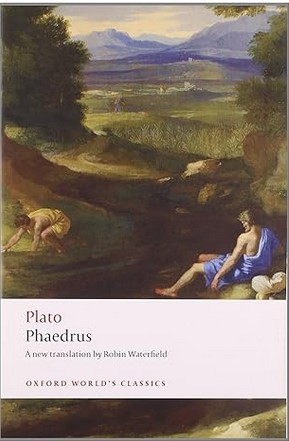
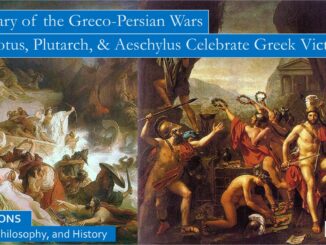
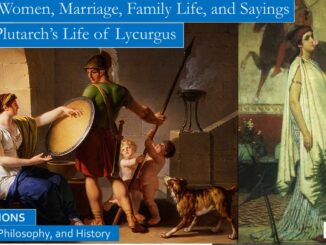
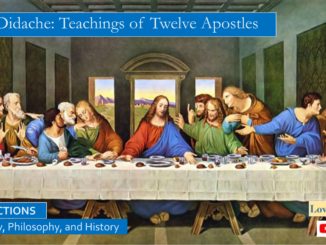
5 Trackbacks / Pingbacks